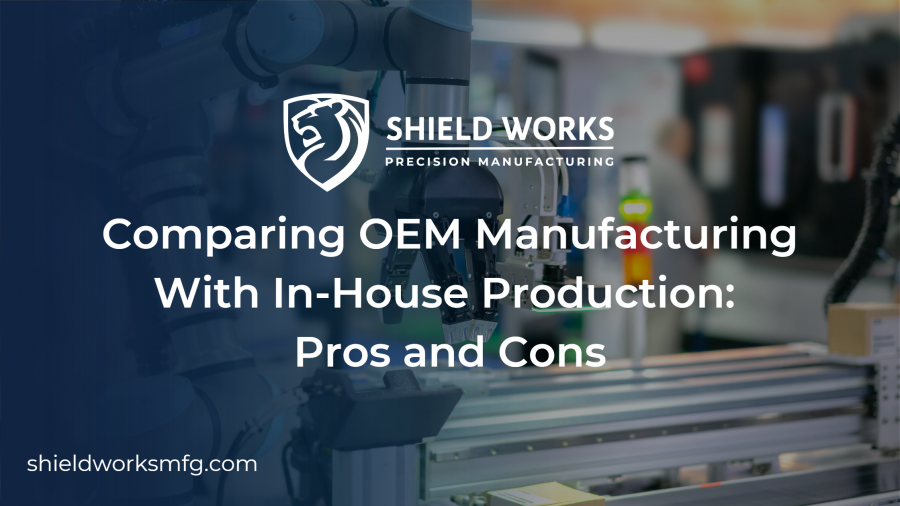Comparing OEM Manufacturing With In-House Production: Pros & Cons

OEM (Original Equipment Manufacturer) manufacturing is a business model in which a company contracts with another company to produce parts or finished products that the first company will sell under its own brand.
In-house production, on the other hand, is the process of producing goods within a company’s own facilities, using its own resources and workforce.
Both OEM manufacturing and in-house production have their own set of benefits and challenges, and companies must weigh the pros and cons of each approach to determine the best fit for their needs.
Pros
Cost-Saving
One of the main benefits of OEM manufacturing is cost savings. OEM manufacturers often have specialized equipment and processes that allow them to produce goods more efficiently and at a lower cost than companies that produce goods in-house.
This can be particularly beneficial for companies that do not have the resources or expertise to produce certain products themselves.
OEM manufacturing can also allow companies to scale their production more quickly, as they can leverage the existing production capacity of their OEM partners rather than building and maintaining their own facilities.
Focused on Core Competence
Another advantage of OEM manufacturing is the ability to focus on core competencies. By outsourcing non-core production activities to OEM partners, companies can free up resources and focus on their core competencies, such as research and development, marketing, and sales.
This can help them to be more competitive and innovative in their market.
Cons
Loss of Control
However, there are also some potential drawbacks to OEM manufacturing. One concern is the potential loss of control over the production process.
When companies outsource production to OEM partners, they may have less visibility into and influence over the production process, which can lead to issues with quality, delivery, or compliance.
It is important for companies to carefully manage their OEM relationships and establish clear lines of communication and expectations to minimize these risks.
IP Risk
Another challenge of OEM manufacturing is the potential loss of intellectual property. When companies share their designs and technology with OEM partners, there is a risk that this information could be leaked or copied. To protect their intellectual property, companies must have strong contracts in place and carefully manage their relationships with OEM partners.
However, in-house production can also be more expensive than OEM manufacturing. Companies must invest in their own production facilities, equipment, and workforce, which can be a significant upfront cost.
In-house production can also be less flexible than OEM manufacturing, as it requires a more permanent and fixed production capacity. This can be a disadvantage for companies that need to scale their production up or down quickly in response to changes in demand.
Why a Good OEM Manufacturer Can Help You Overcome These Drawbacks
There’s always a solution to every problem. How to overcome these OEM challenges so that you can minimize the risk and fully enjoy its benefits?
One effective way is to work with an OEM manufacturer. Let the professional do their work.
But how to ensure that your product is in good hands? Here are a few key qualities to look for:
Strong communication
A great manufacturing company will have strong communication processes in place to ensure that there are clear lines of communication and expectations between the company and its OEM partners. This includes regular updates on production progress, alerts about any potential issues, and an open-door policy for addressing concerns or questions.
Quality control
A great manufacturing company will have robust quality control processes in place to ensure that the products they produce meet the standards of their clients. This may include measures such as inspections, testing, and certification to ensure that products meet relevant quality, safety, and regulatory standards.
IP protection
A great manufacturing company will have strong processes in place to protect their clients’ intellectual property. This may include measures such as non-disclosure agreements, licensing agreements, and technology transfer agreements to ensure that clients’ designs and technology are kept confidential. A great manufacturing company will also have robust processes in place to prevent the unauthorized use or reproduction of clients’ intellectual property.
Compliance
A great manufacturing company will be compliant with relevant laws and regulations, including labor laws, environmental regulations, and intellectual property laws. This ensures that their products are produced ethically and sustainably, and helps to protect their clients’ intellectual property.
Flexibility
A great manufacturing company will be flexible and able to adapt to changing customer needs and market conditions. This may include being able to scale production up or down quickly in response to changes in demand or offering custom solutions to meet specific needs.
Innovation
A great manufacturing company will be innovative and constantly seeking ways to improve their processes and products. This may include investing in new technologies, implementing lean manufacturing principles, or developing new products and services.
In conclusion, both OEM manufacturing and in-house production have their own set of benefits and challenges. Companies must carefully weigh the pros and cons of each approach to determine the best fit for their needs.
If you are looking for a great OEM manufacturer that check all the boxes of the aforementioned criteria, look no further than Shield Works. Our transparency, flexibility and integrity are proven by our over 17 years in the industry and our IP-Protective Production Zone. Contact us now!
